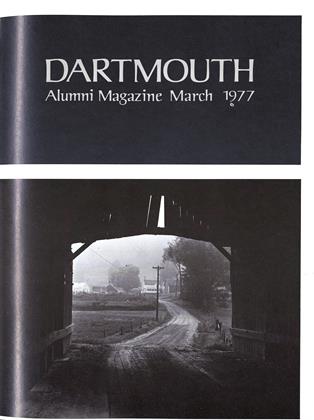(1903-1976)
I FIRST came to know Alex in 1967 when I began attending the Thursday Poets' Workshop in the old Poetry Room of Baker Library. He and the late Ramon Guthrie carried on the discussion of poems in such high good spirits and with such kindly candor as to make the shyest freshman feel at home, let alone a new faculty member. The tone of these meetings was established by Alex's innate courtesy, his sensitivity to the feelings of others and, above all, his generosity. Even after I began to act as moderator upon Alex's retirement in 1968, it was his faithful attendance and interest that provided the foundation upon which the workshop rested.
Others such as Tom and Vera Vance can better speak of the origins of the Thursday Poets under Alex and Dilys Laing after World War II and of how the group early recognized the talent of Philip Booth, Bink Noll, John Ciardi, Richard Wilbur, and other now long-established poets. I feel more comfortable recalling the occasional small gatherings of three or four, where Alex, after patiently praising a student's poem with a deference possible only in one of true magnanimity, went on to suggest that a word might be changed here, a line be put in a little further down....
Only after all others had received their due could we prod Alex to reveal his own poem, invariably an example of his love of the art and the care she exacts from her worshipers. I can hear his voice now, when 1 re-read many of those poems in BrantPoint: "The Good Treason," "Deep Meadow," above all, "The Trout." "The Trout" (of which I am so fortunate to have a tape recording) is a poem about the near-death of Alex's father, about the great spaces that separate those who are fondly, and sometimes miraculously, held together in love. Alas, those of us who heard him read it little thought its meaning for us would be sharpened at such cost!
Alex knew that poets are both born and made by loving application to their craft and, further, that there is a mysterious alchemy at work when they gather, an infection that can spread from person to person in a way that eludes the analytical mind and its hunger for measurable results. And always beside us on the shelves of the room were the works of the masters, to remind us that poetry has a life of its own and steadily comes into being.
Others in the community can more knowledgeably speak of Alex's loving involvement with the Co-op, with ecology, with politics, indeed with any cause that appealed to his sense of justice and his generosity. In all these areas he frequently championed the unpopular cause with a consistency that drew many to him as their patron. The following poem is based upon Alex's protection of the wildlife that was nurtured on his garden, that kindness to animals recalled so vividly in Ramon Guthrie's "The Extra Row" (if I correctly remember the title). Likewise, many of us can attest to having found in him and Roni protectors and in their home a preserve.
I have tried to put some of these feelings, however inadequately, into "His Ground," the poem that follows. One footnote: Alex would no doubt heartily protest his apotheosis by the mouse, his agnosticism sometimes taking the form of ambivalent remarks to God (as in the marvellous and characteristic poem, "A Prayer for His Friend in the Hospital," written for Ramon Guthrie). Nevertheless, from my own - and the mouse's point of view, I feel the comparison must be drawn. It is based on one incident (hardly unique) in Alex's life. At his and Roni's for dinner one winter evening, we received an apology from the host for the small size of the fire in the fireplace: when he'd gone to take more logs from his woodpile, he'd discovered a family of mice under the first one, and so had put it back. That action speaks for his whole life.
His Ground
Woodchuck:
This is the good ground. Here the small ones feed without fear. No green thing makes us sick. No jaws seize the foot. No fire rips open the night.
Raccoon:
Here the trees welcome us like mothers and the can lid comes off easily and the dogs sleep in the house.
Rabbit:
Here there is no Farmer MacGregor. Not one of ours has lost his coat while after the carrot, choicest of roots. No gate shuts us out from the leafy sweetness. The face rising over the cabbages is like the moon's, full of light.
Mouse:
I saw the face of God: In winter He lifted up my roof and put it down again.
All:
Together we live in peace and fullness sharing with each the fruits of the earth here where the rain falls even in drouth making a river of living water by which our children shall prosper forever. This ground is best.
 View Full Issue
View Full Issue
More From This Issue
-
 Feature
FeatureDinner for the Colonel
March 1977 By BRAVIG IMBS -
 Feature
FeatureWomen and Admissions: All Deliberate-speed Ahead
March 1977 -
 Feature
FeatureSleep-filled Days, Gambling Nights
March 1977 By BRAD W. BRINEGAR -
 Feature
FeatureArtists
March 1977 -
 Article
ArticleRambling with Melancholy
March 1977 By JACK DEGANGE -
 Article
ArticleA Versatile, Admirable Teacher With "Every Feature of a Drill Sergeant'(sic)
March 1977 By S.G.








